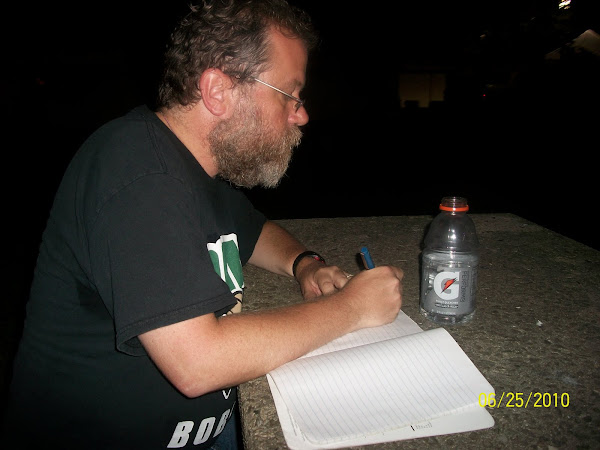When I was finally flush enough to afford a Clifton Heights apartment, proximity to Duttenhofer's Book Treasures (and, I admit, to the bars) was my primary consideration. I had fallen in love with Duttenhofer's the first time I visited it in the mid-1980s, when I was living in a rented room above a Dairy Barn in Hartwell and working too few hours at Feicke Web. Russ was behind the glass counter, very helpful and knowledgeable about anything in print, and the store looked much more pleasant than the intimidating Acres of Books on Main St. I learned later that he had been an attorney and a judge in Clermont County, and when he left the legal profession, he took a job as a cashier for Stanley Duttenhofer, the store's founder and original owner, and bought the store when Stan decided to retire.
He knew me as a customer until I moved to a small apartment above the Christian Science Reading Room on W. McMillan St. in 1990. I saw them then almost daily, stopping in to buy the newspaper, chat with him, browse, and occasionally buy, books. The mailbox in my apartment vestibule was small, so I put a tag on its door: CARRIER: Leave packages @ Duttenhofer's! When my job situation was precarious, and I was too poor to afford a phone, he let me use the store's number on job applications.
(I must admit I abused this last favor a little. When I came in to buy the newspaper one morning, he crossly passed along a message: "Joe says he can't meet you at Murphy's Pub until 11:30," and pointedly informed me that the store was not my answering service. Phone service was the first thing I bought when I received my first paycheck from the U.S. Postal Service in May 1992!)
 | |||
| Duttenhofer's Book Treasures, June 2013. Photo by Stephanie Mesler. |
I paid back in any way I could. During my last years in Cincinnati, he often forgot to return the discount book cart to the inside of the store when he locked up for the night. This was the cart that featured books he was selling for $.50 to $1. There were no Gutenberg Bibles or First Folio Shakespeare volumes on the cart, but I knew that he would not want them stolen--otherwise they would have been in the FREE box. I would roll the cart into the vestibule of my building, where it would not be so publicly displayed.
I also remember alerting him to some young scam artists in our neighborhood. These were two little boys, whom I often saw out running the streets as late as 10 p.m. on school nights. I was helping Russ out one Sunday morning, selling newspapers to pedestrians and drivers, wearing my black New York Times apron. A man told me there were two little boys who had tried to sell him The Cincinnati Enquirer's Sunday paper for a dollar. When he pointed them out to me, I shadowed them for a few blocks, and found that they were putting $1.50 in a vend box and taking out the entire stack of papers and reselling them. I told Russ, but he would never tell me if he told the police or not.
(These same kids worked another scam. One night I was coming out of Subway, and they offered to sell me, for $.50, a catalog of night school classes, courses on everything from flirting to bookbinding to bartending. The kid's finger was covering the word FREE in the upper right-hand corner of the page.)
The highest praise he ever gave me was when I visited Cincinnati several years after my move to Columbus. Since that time, he had discontinued his Sunday hours, but I was not aware of this. I went to the store, and the door was unlocked. The lights were all out, except the emergency lights in the back of the room. That was when I saw the sign in the window saying "Closed Sunday."
I went to the nearest pay phone and called him at home. I told him his store's front door was wide open. "You're kidding!" he whispered, sounding totally stunned. I reassured him that I was dead serious--I was using a pay phone where I could keep an eye on the store. He said he had left his cigarettes there the night before, and had gone back to get them, and must have forgotten to re-lock the door.
I told him I would stay at the store until he could come to lock it. "Paul," he said, "What would I do without you?"
Rest in peace, Russell Speidel.
 |
| An interior shot of Duttenhofer's Book Treasures, taken by me in 2012. |




